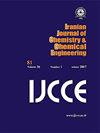Numerical study of natural convection of nanofluids in an inclined flat bottom flask using finite-volume approach.
IF 1
4区 工程技术
Q4 CHEMISTRY, MULTIDISCIPLINARY
Iranian Journal of Chemistry & Chemical Engineering-international English Edition
Pub Date : 2021-09-06
DOI:10.30492/IJCCE.2021.527841.4668
引用次数: 1
Abstract
In this work, we study numerically the natural convection of nanofluids (NF) in an inclined flat bottom flask; it is one of laboratory flasks used in organic chemistry synthesis. The main reason of this study is to enhance the thermal properties of the reaction medium inside the flat bottom flask and to ameliorate the rate of chemical reactions using nanofluids. The flat bottom wall is maintained at a constant high temperature Th. While the top, left and right walls of the cavity are maintained at a low temperature TL. The NF comprises Cu and Al2O3 nanoparticles (NP) suspended in pure water. The governing equations are solved numerically using the finite-volume approach and formulated using the Boussinesq approximation. In this simulation we examined the effects of the NP volume fraction (φ) from 0% to 5%, the Rayleigh number from 103 to 106, the various inclination angles of enclosure (γ=0°,5°,10°, 15°) and the NF type (Cu and Al2O3) on the flow streamlines, isotherm distribution and Nusselt number. The obtained results show that the addition of Cu and Al2O3 NP increases the mean Nusselt number which enhances the heat transfer in the flat bottom flask and causes significant changes in the flow pattern. In addition, the mean Nusselt number is increase with increasing the Rayleigh number and the volume fraction and the best results have obtained from the Cu nanofluide. Also, as the inclination angle increases the mean Nusselt number decreases and the highest value of Nusselt number was obtained for a vertical enclosure (γ=0°). The obtained streamlines are mostly symmetric and their values are generally increase by increasing the Rayleigh number and volume fractions of NPs. Besides, the obtained isotherms are generally follow the geometry of the flat bottom flask.斜平底烧瓶内纳米流体自然对流的有限体积法数值研究。
本文对纳米流体在倾斜平底烧瓶中的自然对流进行了数值研究;它是用于有机化学合成的实验室烧瓶之一。本研究的主要目的是提高平底烧瓶内反应介质的热性能,提高纳米流体的化学反应速率。平底壁保持在恒定的高温下。而空腔的上、左、右壁保持在低温TL下。NF由悬浮在纯水中的Cu和Al2O3纳米颗粒(NP)组成。控制方程采用有限体积法进行数值求解,并采用Boussinesq近似表示。在这次模拟中,我们研究了NP体积分数(φ)从0%到5%,瑞利数从103到106,不同的壳体倾角(γ=0°,5°,10°,15°)和NF类型(Cu和Al2O3)对流线,等温线分布和努塞尔数的影响。结果表明,Cu和Al2O3 NP的加入增加了平均努塞尔数,提高了平底烧瓶内的换热,使流动形态发生了显著变化。平均努塞尔数随瑞利数和体积分数的增加而增加,且Cu纳米流体的效果最好。随着倾角的增大,平均努塞尔数减小,在垂直封闭(γ=0°)处努塞尔数达到最大值。得到的流线大多是对称的,流线的值通常随着NPs的瑞利数和体积分数的增加而增加。此外,所得到的等温线一般遵循平底烧瓶的几何形状。
本文章由计算机程序翻译,如有差异,请以英文原文为准。
求助全文
约1分钟内获得全文
求助全文
来源期刊

Iranian Journal of Chemistry & Chemical Engineering-international English Edition
CHEMISTRY, MULTIDISCIPLINARY-ENGINEERING, CHEMICAL
CiteScore
2.80
自引率
22.20%
发文量
0
审稿时长
6-12 weeks
期刊介绍:
The aim of the Iranian Journal of Chemistry and Chemical Engineering is to foster the growth of educational, scientific and Industrial Research activities among chemists and chemical engineers and to provide a medium for mutual communication and relations between Iranian academia and the industry on the one hand, and the world the scientific community on the other.
 求助内容:
求助内容: 应助结果提醒方式:
应助结果提醒方式:


